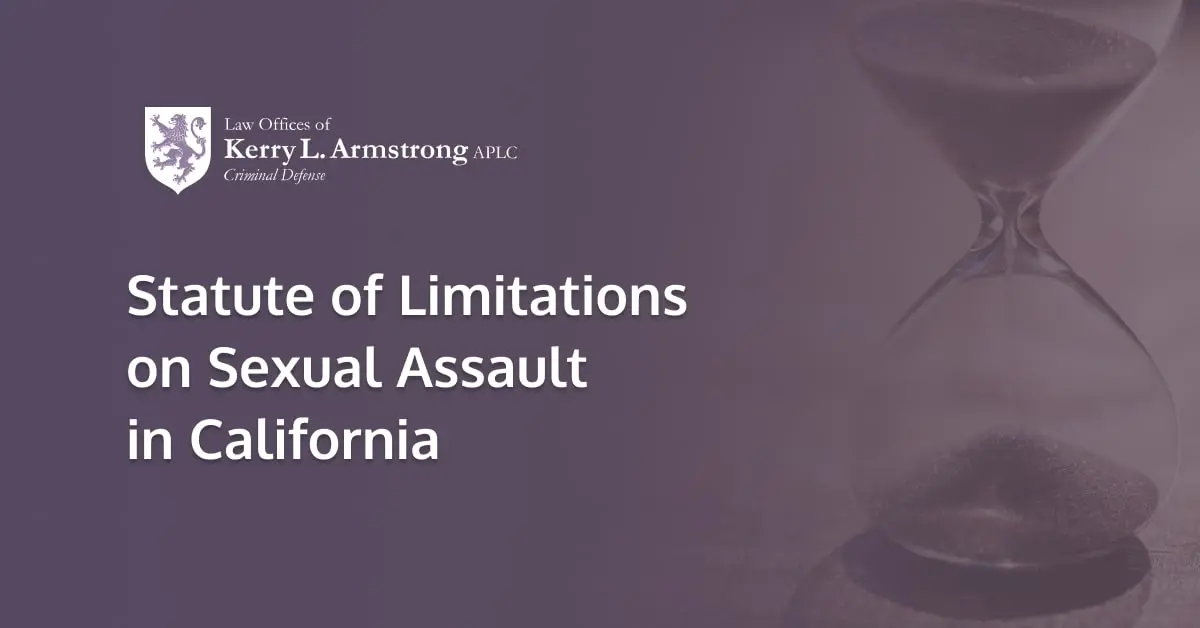
California law has strict time frames during which the prosecution can bring criminal charges against you. The prosecutor cannot file charges after the statute of limitations has expired.
However, the statute of limitations for sexual assault lasts longer than the limitations periods for most crimes.
If you are under investigation for sexual assault or have sexual assault charges, understanding the statute of limitations on sexual assault and how it works is vital to your defense.
At The Law Offices of Kerry L. Armstrong, APLC, we will work closely with you to make sure you understand the charges you face and the defenses you might have—including a defense based on the statute of limitations.
Contact us today at (619) 234-2300 to discuss your case with one of our award-winning sex crime lawyers.
What Is the California Statute of Limitations for Sexual Assault?
The statute of limitations for sexual assault varies depending on the type of allegations you face. Some charges do not have any statute of limitations.
For example, any charge for which the penalty is life in prison—with or without the possibility of parole—has no statute of limitations.
Under California Civil Procedure Code § 340.16, adult victims of sexual abuse and assault can file a lawsuit within 10 years of the incident. Alternatively, they may file within three years of discovering an injury or illness caused by the assault.
Penal Code 799(b)(1) indicates that the California rape statute of limitations doesn’t exist because the prosecution can commence at any time.
Consequently, the prosecution can take their time gathering evidence until they have enough to convict you before filing charges.
It also means that the victim could say nothing for years and then come forward.
However, this rule applies to allegations arising on or after January 1, 2017, or to offenses for which the statute of limitations had not expired by that date.
The sexual assault offenses that have no statute of limitations include:
- PC 261,
- PC 264.1,
- PC 286,
- PC 287,
- PC 288,
- PC 288.5,
- PC 289, or
- The crimes previously listed in PC 262 and 288a.
Only specified subdivisions of the listed sections of the Penal Code have no statute of limitations. Other crimes listed within these laws could have statutes of limitations.
The general rule changes if the alleged victim was under 18 at the time of the offense.
For crimes committed after January 1, 2015, or for crimes for which the statute of limitations had not expired, the statute of limitations expires on the child’s fortieth birthday.
Shorter Statute of Limitations on Sexual Assault Charges
If the offense you face does not fall into the above-mentioned categories, another statute of limitations rule may apply.
Any felony punishable by a sentence in the state prison for eight years or more has a six-year statute of limitations unless the crime falls under the rule in PC 799(b)(1).
California law has a three-year statute of limitations for any offense where the penalty could involve state prison, including so-called wobbler offenses.
Seeking the advice of a knowledgeable and skilled defense attorney could help you use California’s statute of limitations to your advantage.
Call or fill out the form to arrange a free consultation with a knowledgeable and experienced San Diego sex crimes lawyer.
Contact a San Diego Sex Crimes Lawyer Today
Sexual assault allegations could have life-altering consequences. You will need an experienced and aggressive sex crimes defense attorney to protect your rights.
Our criminal defense lawyers are always ready to provide you with superior advocacy and personalized service.
At The Law Offices of Kerry L. Armstrong, we offer you emotional support and exceptional service. Contact us today at (619) 234-2300 for a free consultation.


